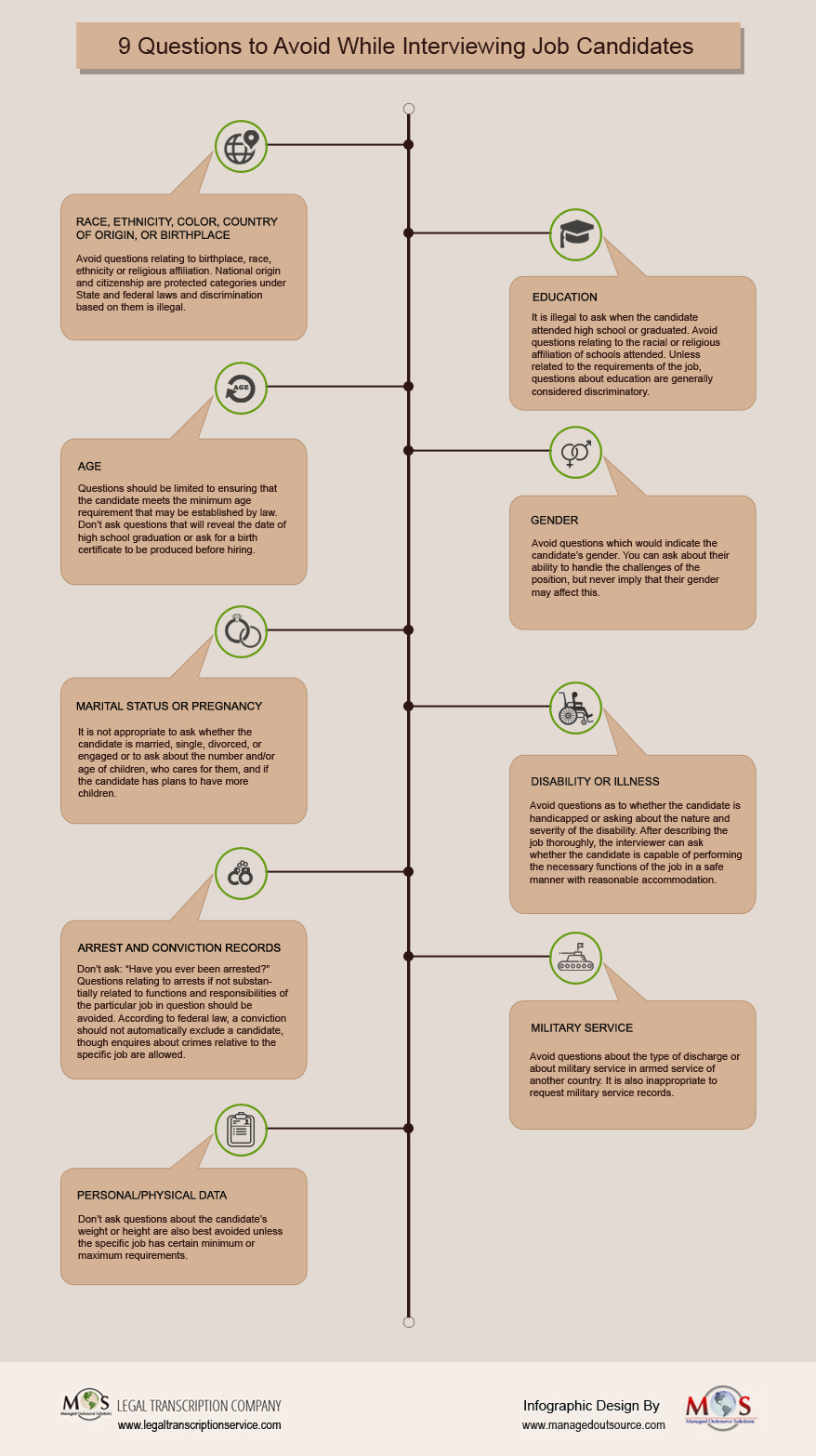
According to a recent Forbes article, the best interviews are conversations. The interrogatory style with a structured script is no longer the best way to conduct a job interview. Trite, pointless and insulting interview questions can only put off candidates and kill your company’s employer brand. Moreover, interview formats have changed drastically over time and managers need to be well aware of the questions they should NOT ask. In fact, asking inappropriate questions can put the organization at risk of litigation. Here are nine questions to avoid while interviewing job candidates:
- Race, ethnicity, color, country of origin, or birthplace: Avoid questions relating to birthplace, race, ethnicity or religious affiliation. National origin and citizenship are protected categories under State and federal laws and discrimination based on them is illegal.
- Education: It is illegal to ask when the candidate attended high school or graduated. Avoid questions relating to the racial or religious affiliation of schools attended. Unless related to the requirements of the job, questions about education are generally considered discriminatory.
- Age: Questions should be limited to ensuring that the candidate meets the minimum age requirement that may be established by law. Don’t ask questions that will reveal the date of high school graduation or ask for a birth certificate to be produced before hiring.
- Gender: Avoid questions which would indicate the candidate’s gender. You can ask about their ability to handle the challenges of the position, but never imply that their gender may affect this.
- Marital status or pregnancy: It is not appropriate to ask whether the candidate is married, single, divorced, or engaged or to ask about the number and/or age of children, who cares for them, and if the candidate has plans to have more children.
- Disability or illness: Avoid questions as to whether the candidate is handicapped or asking about the nature and severity of the disability. After describing the job thoroughly, the interviewer can ask whether the candidate is capable of performing the necessary functions of the job in a safe manner with reasonable accommodation.
- Arrest and conviction records: Don’t ask: “Have you ever been arrested?” Questions relating to arrests if not substantially related to functions and responsibilities of the particular job in question should be avoided. According to federal law, a conviction should not automatically exclude a candidate, though enquires about crimes relative to the specific job are allowed.
- Military service: Avoid questions about the type of discharge or about military service in armed service of another country. It is also inappropriate to request military service records.
- Personal/physical data: Don’t ask questions about the candidate’s weight or height are also best avoided unless the specific job has certain minimum or maximum requirements.
During the interview, hiring managers must focus on interview questions related to the behaviors, skills, and experience needed to perform the specific job. Candidates may sometimes offer information about potential job discrimination topics that you want to avoid. In such cases, avoid pursuing the discussion and bring the conversation back to track by asking a legal job-related question. Don’t use any unsolicited information that the candidate gives you to make your hiring decision.
Now that you know the questions you should not ask prospective employees, review your organization’s interview process and see if it needs to be improved. A recent report in the Gazette says that the companies hiring processes have changed in recent times due to an increased emphasis on positive workplace cultures. Besides the appropriate skill sets for the role, hiring managers now look for personalities and values attuned to the company’s core values. Employers try to evaluate how compatible an individual would be with potential co-workers, and if the candidate has the ability to grow as an employee and become a good team member in the long run.
Audio transcription services can ensure a word-for-word report of the interview, so that nothing is missed. Transcripts will make it easy to read and analyze the content for qualitative information. As job interviews involve many legal considerations, verbatim transcripts can prove useful in the event of a dispute. Reliable interview transcription providers can produce accurate reports from good quality recordings.




